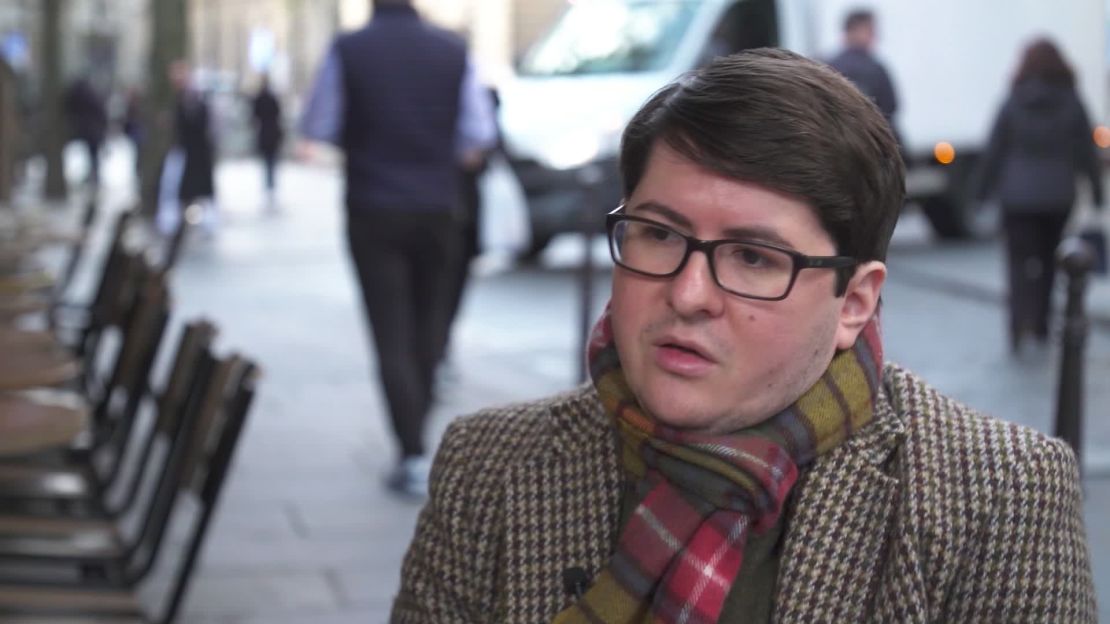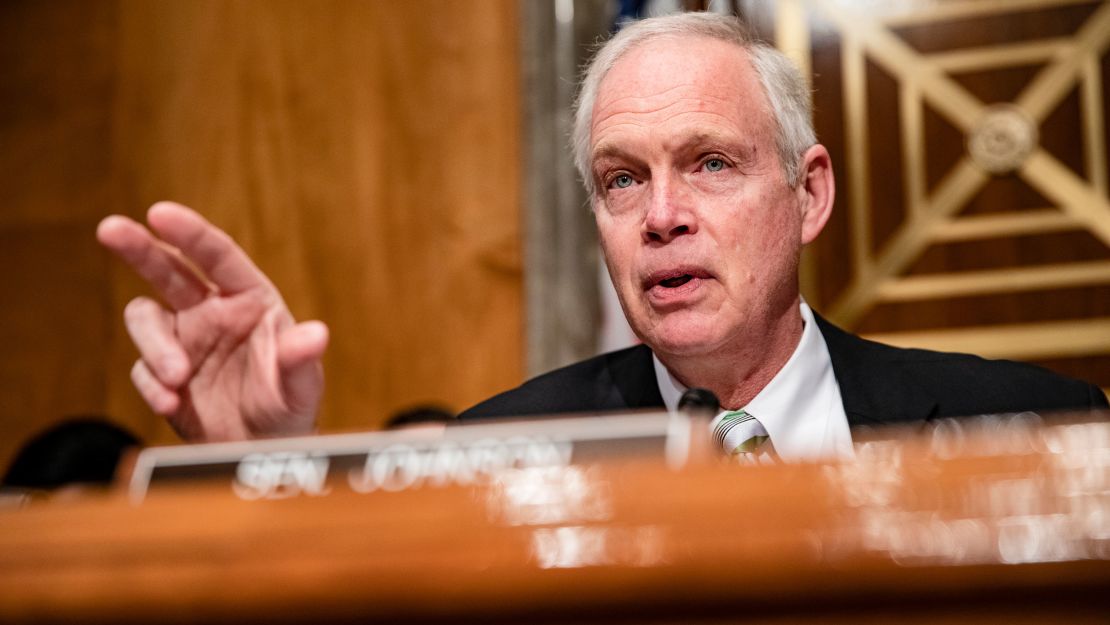When Republican lawmakers this week abruptly canceled a plan to subpoena a former Ukrainian official in their investigations into the energy firm that hired former Vice President Joe Biden’s son, they said it was to allow more time for senators to receive additional briefings.
But a Ukrainian magazine editor has told CNN that the target of the subpoena, Andrii Telizhenko, once offered him money to lobby US senators on behalf of pro-Russian media outlets.
A former Ukrainian diplomat, Telizhenko is an ally of Trump’s personal lawyer, Rudy Giuliani, and has been an enthusiastic proponent of the debunked theory that Ukraine, and not Russia, interfered in the 2016 US elections. Telizhenko has also backed Republican claims that Trump’s Democratic rival, Joe Biden, shut down an investigation into the Ukrainian gas company Burisma when his son, Hunter, served on its board. Biden has consistently denied any wrongdoing.
The Senate Homeland Security and Governmental Affairs Committee called off a vote to subpoena Telizhenko earlier this week, amid accusations from Democrats that the investigation was calculated to damage Biden’s presidential bid.
Questions also swirled about Telizhenko’s reliability as a witness – the FBI briefed staff on issues connected to the subpoena on Tuesday, the day before the committee was supposed to vote, according to a Senate Democratic aide. Telizhenko says he’s the victim of a smear campaign and flatly denied to CNN he was a “Russian agent.”

In a development that could raise more questions about Telizhenko’s reliability, Vladislav Davidzon, who runs a magazine called the Odessa Review, has told CNN that Telizhenko offered him $5,000 in 2018 to approach prominent Republicans to speak out against efforts by Kiev to curb the influence of two TV stations.
CNN has reviewed a series of messages between the two men that came against the backdrop of an attempt by Ukrainian lawmakers to censure two channels, 112 and News One, for allegedly broadcasting Russian propaganda in the years following Moscow’s annexation of Crimea in 2014.
In October 2018, the same month that lawmakers voted in favor of a resolution to sanction the two stations, Telizhenko wrote to Davidzon, asking: “Have a question do you or your father have contacts with US Senators? I really need a favour for witch (sic) I can pay up to 5k.”
Davidzon, 35, is the son of influential US-based Russian language media owner Gregory Davidzon – once dubbed “The Kingmaker of Little Russia” in a 2012 profile by The New York Times.
After expressing concerns about how the new Ukrainian proposals could shut the broadcasters down, Telizhenko then says: “My question is is it possible to get an official comment on a Senators (Rand Paul, Lindsey Graham for example) website next week about this situation of censorship in Ukraine? Really important for me and need fast.”
Davidzon replies: “Ok. I have a bit of time. But not sure what I can do.”
Davidzon told CNN that he considered the offer of money to target senators like Graham was “improper” and never reached out to any US lawmakers as a result.

In a telephone interview on Friday, Telizhenko said he had indeed contacted a small number of people including Davidzon on behalf of 112 and News One. He said the approaches were made on his own initiative and that the money he offered was his own, for expenses incurred.
Graham’s office declined to comment. Paul’s office did not reply, nor did representatives for the two television stations.
Republican-led investigations that could entangle Biden have been gathering speed amid the former Vice President’s surge in the Democratic presidential primaries.
Sen. Ron Johnson, chairman of the Senate Homeland Security and Governmental Affairs Committee, had scheduled a vote on whether to subpoena Telizhenko on Wednesday. Johnson wanted access to information Telizhenko claims to have on Blue Star Strategies, a political consultancy which once employed Telizhenko and that had carried out work for Burisma. However the vote – which was expected to pass along party lines – was called off at the last minute after Johnson wrote to committee members saying he wanted to leave more time for additional briefings. He said he would seek records directly from Blue Star instead.

The top Democrat on Johnson’s committee, Sen. Gary Peters, had been opposed to subpoenaing Telizhenko, arguing that the probes could be tainted by Russian disinformation. He had requested members receive an intelligence briefing on the Ukrainian before considering him as a witness. The decision to call off the vote, however, came as a surprise.
The effort to enlist Telizhenko was launched in December 2019 by a trio of Republican senators – Johnson, chairman of the Homeland Security Committee, Graham, chairman of the Judiciary Committee, and Charles Grassley, chairman of the Finance Committee. They demanded interviews and documents from Telizhenko and Alexandra Chalupa, a former Democratic National Committee contractor. Telizhenko has said that, when he was a diplomat at the Ukrainian embassy in Washington, he was instructed to work with Chalupa to “dig for dirt” on Trump and his team.
The DNC and Chalupa have always denied the claims. Yet Telizhenko’s insistence upon repeating them brought him into Giuliani’s orbit. He accompanied the former New York City mayor on a so-called fact finding mission to Kiev in November and appeared on his podcast earlier this year.
While Sens. Johnson and Grassley have continued to pursue the debunked theory that Ukraine was responsible for an effort to destabilize Trump, Graham has more recently cooled on the effort. In February, Graham said any information coming from Ukraine should be treated with caution.
Telizhenko told CNN that the criticisms of him were part of a smear campaign, saying he had been expecting it after he was detained for four hours at New York’s John F. Kennedy airport on his arrival in the United States in February.
Speaking on Friday, Telizhenko said he understood the vote to subpoena him had been canceled at the last minute after senators were told he had connections with “pro-Russian people in Ukraine.”
“Anybody who has tried to oppose the Democrats, including the President, has been called a Russian asset,” Telizhenko said, denying the claim.
Speaking to CNN before the decision to abandon the subpoena vote, Davidzon said he did not act on Telizhenko’s offer, letting it go “as elegantly as possible.” But in late 2019 he shared what he knew with US authorities after Telizhenko made a series of public comments in support of Giuliani. With Telizhenko poised to provide evidence to the Senate, Davidzon decided to go public. “This type of behaviour absolutely discredits any theories that Mr Telizhenko gives and makes me question his agenda,” Davizdon said.
“The message was evidence to me that, aside from claiming to be a Ukrainian patriot, Mr Telizhenko was probably working for someone with pro-Russian interests at heart and not in Ukraine’s national security interests,” he said.
Davidzon concedes $5,000 was not a lot of money for the request but says he believes the offer was serious and speculates that Telizhenko was “likely making a lot more from whoever was paying him.”
He also claims Telizhenko presented himself to him on other occasions as a go-between for Dmitry Firtash, a Ukrainian oligarch facing charges of bribery in the United States. Firtash’s legal team reportedly assisted Giuliani with his investigations into the Bidens and met with Giuliani’s indicted emissaries to Ukraine, Lev Parnas and Igor Fruman. Firtash’s lawyer declined to comment.
In a set of private exchanges on Facebook dated June 2019, Davidzon asks whether Firtash will be extradited to the US and asks Telizhenko for an interview with him.
Telizhenko replies, seemingly on Firtash’s behalf, saying the case was “still in process.”
“No interviews now (…) he does not give to WSJ even so not for now,” referring to the Wall Street Journal.
Telizhenko told CNN he did not have any contacts with Firtash and had never worked for him.
With Telizhenko now apparently out of the picture insofar as the Republican investigations are concerned, it’s unclear what direction these probes will take. But with Biden’s fortunes on the rise, it seems clear that efforts will continue to uncover information that could potentially derail his campaign.
CNN’s Jeremy Herb contributed reporting from Washington.















